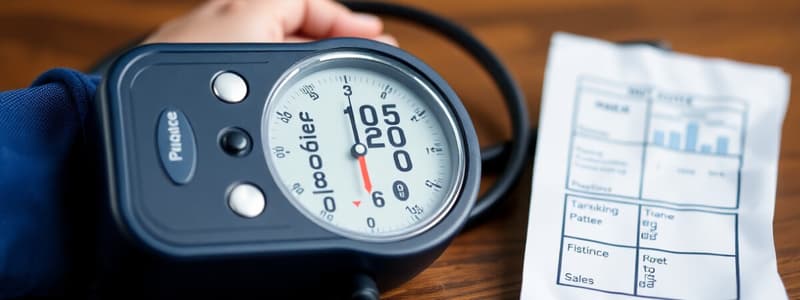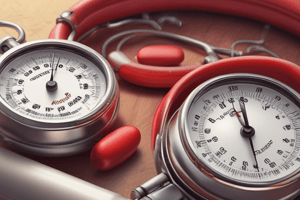Podcast
Questions and Answers
What is the recommended dietary sodium intake for hypertension management?
What is the recommended dietary sodium intake for hypertension management?
- 5,000 mg per day
- 1,500 mmol per day
- 3,200 mg per day
- 100 mmol per day (correct)
Which of the following is NOT considered a major risk factor for hypertension?
Which of the following is NOT considered a major risk factor for hypertension?
- Cigarette smoking
- Obesity
- Insomnia (correct)
- Diabetes mellitus
What should be the systolic blood pressure measurement indicating the need for immediate evaluation or referral?
What should be the systolic blood pressure measurement indicating the need for immediate evaluation or referral?
- 140 mmHg or higher (correct)
- Between 120 and 139 mmHg
- Between 100 and 110 mmHg
- Less than 110 mmHg
Which lifestyle modification is recommended for hypertension management?
Which lifestyle modification is recommended for hypertension management?
What is the normal range for body mass index (BMI) according to the hypertension guidelines?
What is the normal range for body mass index (BMI) according to the hypertension guidelines?
Study Notes
Blood Pressure Classification & Management
- Normal Blood Pressure: Systolic < 120 mmHg, Diastolic < 80 mmHg - Lifestyle modification is recommended
- Elevated Blood Pressure: Systolic 120-129 mmHg, Diastolic < 80 mmHg - Lifestyle modification is recommended
- Stage 1 Hypertension: Systolic 130-139 mmHg, Diastolic 80-89 mmHg - Lifestyle modification and medication may be necessary
- Stage 2 Hypertension: Systolic ≥ 140 mmHg, Diastolic ≥ 90 mmHg - Lifestyle modification and medication are typically required
- Hypertensive Crisis: Systolic > 180 mmHg and/or Diastolic > 120 mmHg - Immediate medical attention is required
Follow-Up Schedule After Initial Blood Pressure Measurement
- If Systolic Blood Pressure is 110 mmHg or higher: Evaluate or refer to a source of care immediately or within one week depending on the clinical situation
Lifestyle Modifications for Hypertension
- Weight Reduction: Maintain a normal body mass index (BMI) of 18.5-24.9 kg/m2
- Dietary Approach to Stop Hypertension (DASH) Eating Plan: Consume a diet rich in fruits, vegetables, and low-fat dairy products. Reduce saturated and total fat intake.
- Dietary Sodium Reduction: Limit sodium intake to no more than 100 mmol per day (2.4 g sodium or 6 g sodium chloride).
- Regular Physical Activity: Engage in regular aerobic physical activity such as brisk walking, jogging, or swimming.
Major Risk Factors for Hypertension
- Cigarette Smoking: Increases the risk of heart disease, stroke, and other health problems.
- Obesity (BMI ≥ 30 kg/m2): Increases the risk of developing hypertension, heart disease, and diabetes.
- Physical Inactivity: Increases the risk of heart disease, stroke, and obesity.
- Dyslipidemia: Abnormal blood lipid levels increase the risk of heart disease and stroke.
- Diabetes Mellitus: Increases the risk of heart disease, stroke, and kidney disease.
- Microalbuminuria or Estimated Glomerular Filtration Rate (GFR): Indicates kidney damage, a risk factor for hypertension.
- Target Organ Damage: Includes left ventricular hypertrophy, angina, prior myocardial infarction, prior coronary revascularization, and heart failure.
Studying That Suits You
Use AI to generate personalized quizzes and flashcards to suit your learning preferences.
Related Documents
Description
This quiz covers the classification of blood pressure and its management strategies, including lifestyle modifications and follow-up schedules. It provides essential guidelines for recognizing hypertension stages and when to seek medical attention. Understand the critical thresholds for blood pressure readings.


